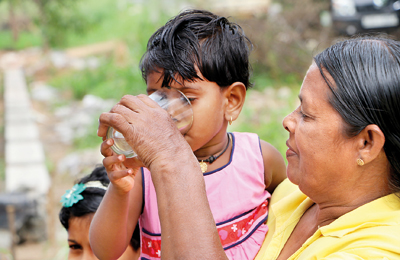Clean drinking water project to help communities battle CKDu
View(s): Chronic Kidney Disease of Unknown aetiology (CKDu) has crippled communities across the country and become a national issue. Nowhere has its impact been more felt than in the North Central Province, where the disease was first identified in the early 1990s and which today records the highest number of deaths due to CKDu. Caused as a result of drinking unsafe water, the true cost of CKDu goes far beyond what meets the eye, affecting the wellbeing as well as the financial stability of communities.
Chronic Kidney Disease of Unknown aetiology (CKDu) has crippled communities across the country and become a national issue. Nowhere has its impact been more felt than in the North Central Province, where the disease was first identified in the early 1990s and which today records the highest number of deaths due to CKDu. Caused as a result of drinking unsafe water, the true cost of CKDu goes far beyond what meets the eye, affecting the wellbeing as well as the financial stability of communities.
HSBC together with Berendina Development Services is addressing this complex issue, putting in place a social enterprise system that provides access to safe water, whilst being commercially viable and sustainable in the long term.
In addition to managing the immediate need of the lack of access to safe drinking water, the project, developed based on Berendina’s social business model, aims to address more deep rooted social needs of communities such as unemployment. With the funding provided by HSBC, Berendina Development Services installed six “Reverse Osmosis” water purification units in Kanda-rathmale, Thalga-hapothana, Konkubukwawa and Hibutu-gollewa in the Anuradhapura district, and Adigama and Kalpe in Puttalam District benefitting close to 2,200 families, over an 18-month period starting 2017.
In each community, HSBC and Berendina Development Services, worked together with an advisory board comprising Grama Niladari (GN), Public Health Inspector (PHI) and community leaders.The community based organisations (CBO) in each location were involved in the construction process to ensure a sense of ownership which would contribute towards the sustainability of the project. Volunteers from HSBC joined in land clearing ‘shramadana’ campaigns.
Currently communities obtain safe water by purchasing it from a supplier. As part of the social enterprise scheme, a thorough analysis was conducted of the market price of water and it was decided that purified water would be sold at one rupee per litre which is less than the market rate. The water purification plant has the capacity to distribute 3,000 – 5,000 litres of safe water per day. A revenue of Rs. 90,000 was recorded in the first six months of operations, and it is expected to increase in the coming months.
The community based organisations were trained on daily operations and maintenance of the water system, as well as on financial know-how such as book-keeping. A general health awareness drive was also conducted amongst community members.
The revenue generated is more than adequate to cover basic operations and maintenance cost of the plant. The remaining profits are given back to the community in the form of critically needed medical assistance for CKDu affected families and educational assistance for underprivileged children.
While Sri Lanka has a population of 21 million today, more than 75 percent live in rural areas with limited access to safe drinking water. Only 40 percent of Sri Lanka’s population have access to pipe-borne water, with 15 out of 25 districts in the country still depending on ground water.


